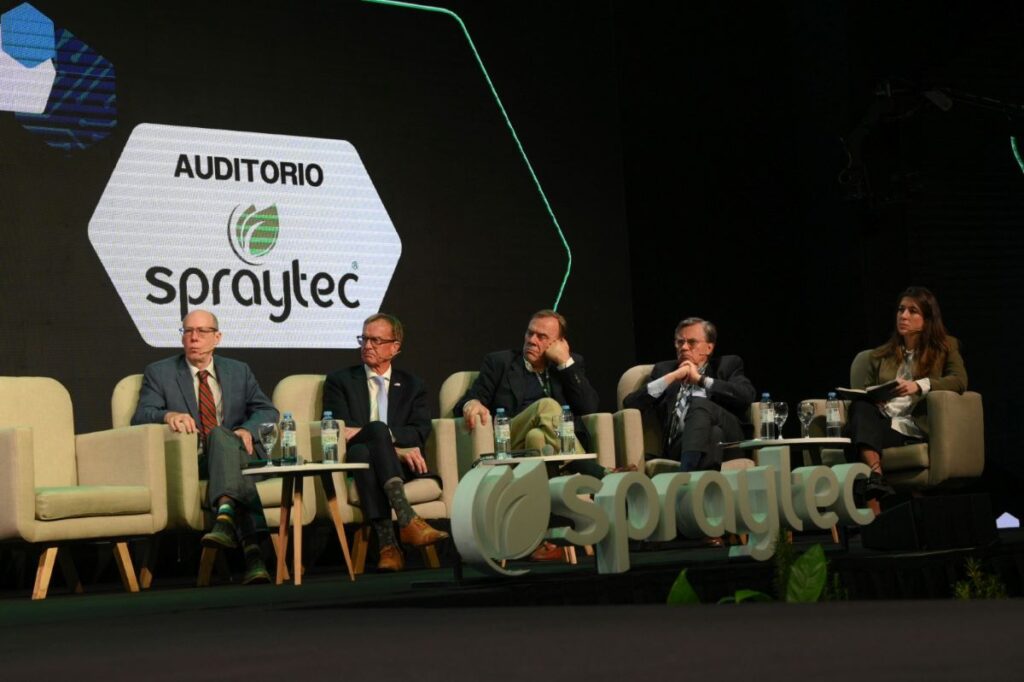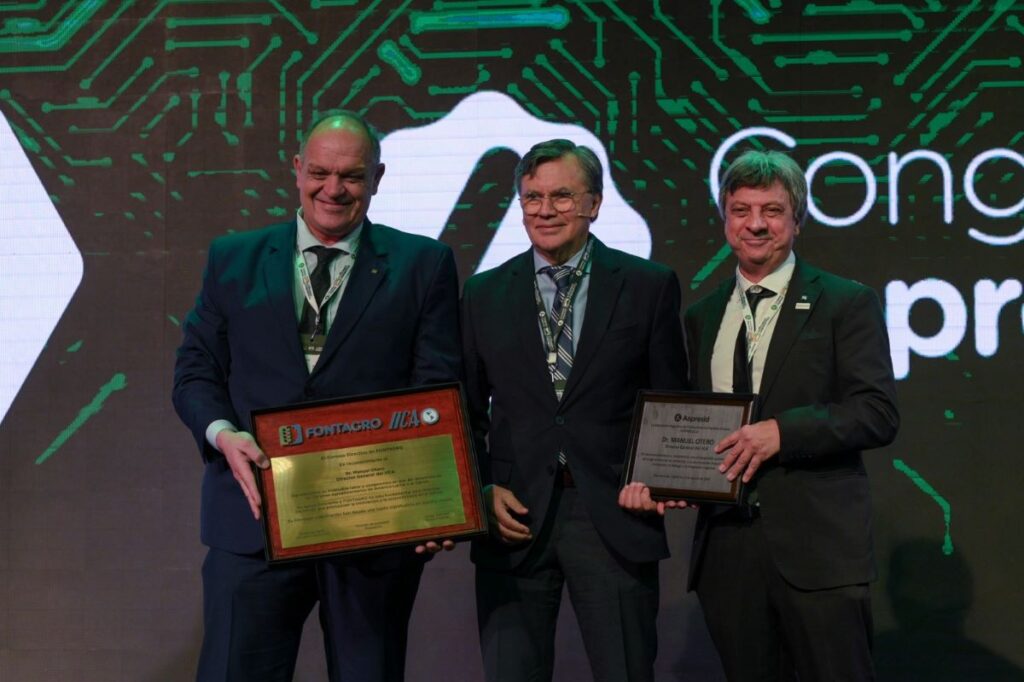
Buenos Aires, 8 August 2025 (IICA) – Governments and the production and industrial sectors must work together to develop a new narrative for agriculture that conveys its true value as part of the solution to global challenges while also addressing consumers’ needs. This was the consensus among leading international figures speaking before a large audience at the Conference of the Argentine Association of Direct Seeding Producers (AAPRESID) in Buenos Aires.
The leaders took part in a high-level panel discussion organized by AAPRESID, a regional and global leader in production and environmental conservation, together with the Inter-American Institute for Cooperation on Agriculture (IICA).
The three-day conference will spotlight key issues related to the future of agriculture, which must drive innovation in science and production.
For the second consecutive year, IICA is participating actively in the conference, one of the year’s most important events for the agriculture sector in Latin America.
Entitled “Building a new narrative: the future of agriculture and agrifood systems of the Americas”, the panel discussion encouraged participants to reflect on ways to create a more realistic vision for agriculture, both in the present and in the future.
Jack Bobo, Executive Director of the Rothman Family Institute for Food Studies at the University of California, Los Angeles (UCLA); Kip Tom, Vice Chair of Rural Policy at the America First Policy Institute and former U.S. Ambassador to the UN Agencies in Rome; Walter Baethgen, Senior Research Scientist at the Columbia Climate School; Marcelo Torres, President of AAPRESID; and Manuel Otero, Director General of IICA, were the panelists.
Upon conclusion of the panel discussion, AAPRESID and FONTAGRO, a fund that finances innovative agricultural projects in Latin America and the Caribbean, presented Otero with awards in recognition of his work at the helm of IICA.
FONTAGRO’s President, Nicolás Bronzovich, who also leads the National Institute of Agricultural Technology (INTA) of Argentina, presented the award on behalf of the Fund. He noted that Otero’s constant support has been key to driving initiatives that foster innovation and sustainability in the sector.
AAPRESID, in turn, recognized the IICA Director General’s commitment to sustainable agricultural development in the hemisphere, dialogue and regional integration. The award was presented by its President, Marcelo Torres.
Combating misinformation and polarization
“The current narrative surrounding agriculture is dividing us and making everything more difficult, because it presents agriculture as an activity that uses 40% of the land and 70% of the planet’s fresh water resources, and yet 800 million people go to bed hungry every day. That’s why many people think agriculture is a problem”, explained Jack Bobo.
The specialist in sustainable food systems considered that, at a time when misinformation and polarization are prevalent, the only way to resolve this distorted image of agriculture is for various stakeholders to work together.
“We need to explain that the history of agriculture is a success story and get people excited about innovation. Thanks to better food and nutrition, life expectancy today is much higher than it was in the 19th century in every country in the world. While it is unacceptable that 800 million people still suffer from hunger, they represent 10% of the world’s population, compared to 30% 30 years ago”, he stated.
“Things aren’t going from bad to worse. They’re improving and will continue to do so, just maybe not as quickly as we need them to”, he concluded.
Kip Tom argued that food security is critical for national security and the preservation of democracy in countries.
“When soils are resilient”, he reflected, “people are well fed and democracy thrives. A nation that cannot feed itself cannot defend itself. Every harvest serves as a country’s shield against external dependence”.
Tom added that food production represents a valuable opportunity for the Americas as a region: “We need to increase productivity and efficiency, as well as reduce our dependence on imported goods and ensure global demand for our products. The Western Hemisphere must grow stronger through agriculture”.
Walter Baethgen considered that the global environmental agenda is currently defined by the European Union and that that must change. “The agenda must be defined by the entire world, based on coordinated policy and diplomacy actions and compelling scientific evidence. That is why IICA’s role is so important”.
Baethgen underscored Latin America’s enormous wealth of natural resources, and considered that the challenge involves utilizing them sustainably and communicating this to people living in cities, far away from where production processes take place.
Regarding agriculture’s potential, he described soils as a powerful environmental conservation tool: “They store 860 gigatons of carbon. If we managed to increase that amount by just 0.4%, we would offset 70% of total emissions into the atmosphere, three-quarters of which are generated by the burning of fossil fuels”.
“We are facing a very challenging context characterized by increasingly prolonged droughts, floods, and extreme temperatures. We are under threat because society is pointing a finger at agriculture, viewing the sector as part of the problem rather than part of the solution. There is growing disinterest among young people to become involved in agricultural activities; the solution seems to be to move agriculture further and further away from societies, which are primarily urban”, remarked Marcelo Torres.
The President of AAPRESID emphasized that producers must be protagonists of change and become involved in innovation processes. “Producers who are isolated in their fields and fail to connect with other producers or with science and technology are doomed. Agriculture has a great future, but we must take advantage of this crisis to rethink our next steps”, he warned.
Manuel Otero called for a collective effort among all stakeholders to develop a new narrative and underscored the need to understand consumer psychology.
“I am certain that agriculture in the Americas sometimes suffers from low self-esteem. We must believe more in ourselves. And to succeed in that regard, we need a new narrative that explains that agriculture has been and is critical to the region’s development. We account for about 23% of global agricultural production, which means we are the guarantors of global food security and environmental sustainability. We are being called upon to take on a leading role, and we must say this loudly and clearly”, he said.

More information:
Institutional Communication Division.
comunicacion.institucional@iica.int











